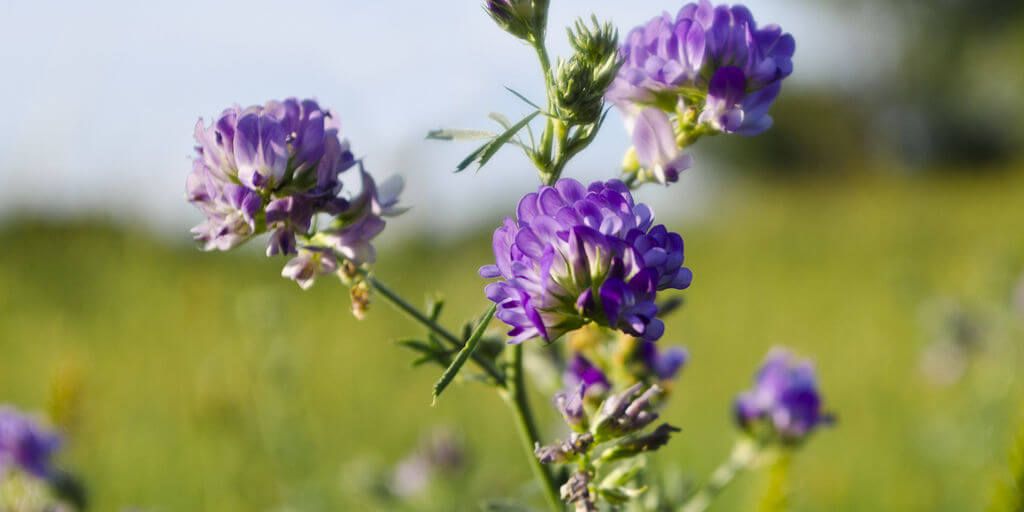Alfalfa, (Medicago sativa), is a perennial flowering plant that belongs to the pea family Fabaceae. It’s cultivated as an important forage crop for livestock, particularly as hay or silage. It’s known for its deep root system, which enables it to access water and nutrients from deeper soil layers, making it drought-resistant and highly nutritious.
Alfalfa is rich in proteins, vitamins and minerals, and it’s often fed to cattle, horses and other livestock. Alfalfa is also consumed by humans, often sprouted and used in salads and sandwiches for its high nutritional value.
History of Alfalfa
Alfalfa is a name everyone has heard, but few know much about it other than the fact that it’s a plant. The alfalfa plant is primarily native to Asia, and is considered to be one of the first known herbs to mankind. It is a member of the Pea family Fabaceae and is also called Lucerne.
The word alfalfa is derived from Arabic, specifically the phrase al-fac-facah, which literally means “Father of all foods” because it is so rich in essential nutrients. Clearly, ancient ancestors considered alfalfa to be vital to their everyday lives. They used it not just for their own consumption, but to feed their livestock and to better fertilize their agricultural lands due to its abundance of vitamins and minerals. It is often used for feeding animals as it has the highest nutritional value of all the hay/forage crops.
Although it originated in Asia, it is now extremely common in the USA, Europe and Canada.
Alfalfa Health Benefits
The alfalfa plant, along with many other Ancient herbs, has a long list of health benefits which we will explore below:
Vitamins in Alfalfa
The alfalfa plant is naturally high in many essential vitamins, including; vitamin A, vitamin D, vitamin E and vitamin K, and almost the full family of B vitamins. The plant has an unusual, extensive root system that can reach as far as 60 feet into the soil. This is what allows the plant to absorb more vitamins and minerals than the average plant, which explains its title as “The king of all foods“.
Each individual vitamin has an abundance of health benefits in itself, making them crucial to overall human health. It is surprising for so many different types of vitamins to be present in just one plant, which makes the lure of consuming this plant all the greater.
It is interesting to note that Alfalfa is NOT a significant source of vitamin C, hence why it’s important to eat a range of fruit and vegetables to get the full spectrum of vitamins and other essential nutrients.
Minerals in Alfalfa
Alfalfa provides a range of important minerals including; biotin, calcium, folic acid, iron, magnesium, potassium and many others.
High Protein Content in Alfalfa
Alfalfa is very high in protein, especially when dried. Alfalfa is relatively high in protein compared to many other forage crops. The protein content of alfalfa can vary depending on factors like the stage of growth, soil quality, and environmental conditions. However, on average, alfalfa typically contains around 15-20% protein in its dry matter.
This makes it a valuable source of dietary protein for livestock such as cattle, horses and sheep, as well as for humans when consumed as sprouts or in other forms.
Diuretic Effect of Alfalfa
The alfalfa plant has been used widely for diuretic purposes. This is especially common among people who had been experiencing heavy water retention or urinary tract infections.
Using a natural herb as a laxative or diuretic is usually much gentler on the system than using an over the counter remedy, because there aren’t any added synthetic compounds that could further irritate the situation.
Alfalfa as a Blood Purifier and Detox
It has been found that regularly ingesting alfalfa can aid in flushing the bowels of built up toxins. The alfalfa herb is very good at detoxifying and better purifying the blood. As a result, regular consumption of alfalfa can lower blood pressure and balance hormones.
Additional Benefits of Alfalfa
Alfalfa has beneficial healing properties against; bad breath, sore or achy joints, imbalanced skin conditions, and it even increases immune system functionality.
When consumed regularly, Alfalfa acts as an alternative to over the counter pain medicines for headaches and migraines, due to its high calcium and magnesium levels.
Alfalfa is also believed to have a direct connection to lowering cholesterol.
How To Take Alfalfa
Getting alfalfa into one’s diet is not at all complicated. It can be taken in many different forms. A popular way to get this herb into the system would be to drink brewed tea daily. For added benefits and taste, a helpful suggestion would be to brew alfalfa tea with another flavored tea, as while the health benefits of this herb are extremely apparent, the taste can be slightly bland.
This herb can also be taken in capsule form, in much the same way a person might consume their daily multi vitamin. Dried Alfalfa is as good, if not better, than fresh Alfalfa, so capsules are a great way to take it.
Alfalfa can also be mixed in with different foods, including; salads, soups, casseroles, with hardly any change in taste. The alfalfa herb is very mild in flavor and because of this, it can easily be used in many different ways to add health benefits to a wide variety of dishes.
Shopping
| Visit the new SHOPPING page for a wide selection of amazing products! |
Always take care when taking herbs and Read Our Disclaimer.
Alfalfa Notes / Side Effects
While alfalfa is generally safe for most people when consumed in moderate amounts, there are some potential side effects and considerations to be aware of:
Allergic reactions: Some individuals may be allergic to alfalfa. Allergic reactions can vary in severity and may include symptoms such as itching, rash, swelling, or difficulty breathing.
Photosensitivity: Alfalfa contains compounds called psoralens, which can make the skin more sensitive to sunlight. In some individuals, excessive consumption of alfalfa or alfalfa supplements may increase the risk of sunburn or other skin reactions when exposed to sunlight.
Hormonal effects: Alfalfa contains phytoestrogens, which are plant compounds that mimic the activity of estrogen in the body. While this can have potential health benefits for some individuals, excessive consumption of alfalfa or alfalfa supplements may have hormonal effects, particularly in individuals with hormone-sensitive conditions such as breast cancer or endometriosis.
Blood thinning: Alfalfa contains vitamin K, which plays a role in blood clotting. While alfalfa is not a significant source of vitamin K compared to other foods, consuming large amounts of alfalfa or alfalfa supplements may interfere with blood clotting in individuals taking anticoagulant medications or those with bleeding disorders.
Medication interactions: Alfalfa supplements may interact with certain medications, including blood thinners, estrogen medications, and drugs that suppress the immune system. If you’re taking any medications, consult your healthcare provider before adding alfalfa supplements to your diet.
Gastrointestinal discomfort: Some people may experience gastrointestinal discomfort, such as gas, bloating, or diarrhea, when consuming alfalfa or alfalfa supplements, particularly if they have underlying digestive issues or if alfalfa is consumed in large quantities.
It’s important to consume alfalfa in moderation and consult with a healthcare professional if you have any concerns or underlying health conditions before adding alfalfa supplements to your diet.



Leave a Reply